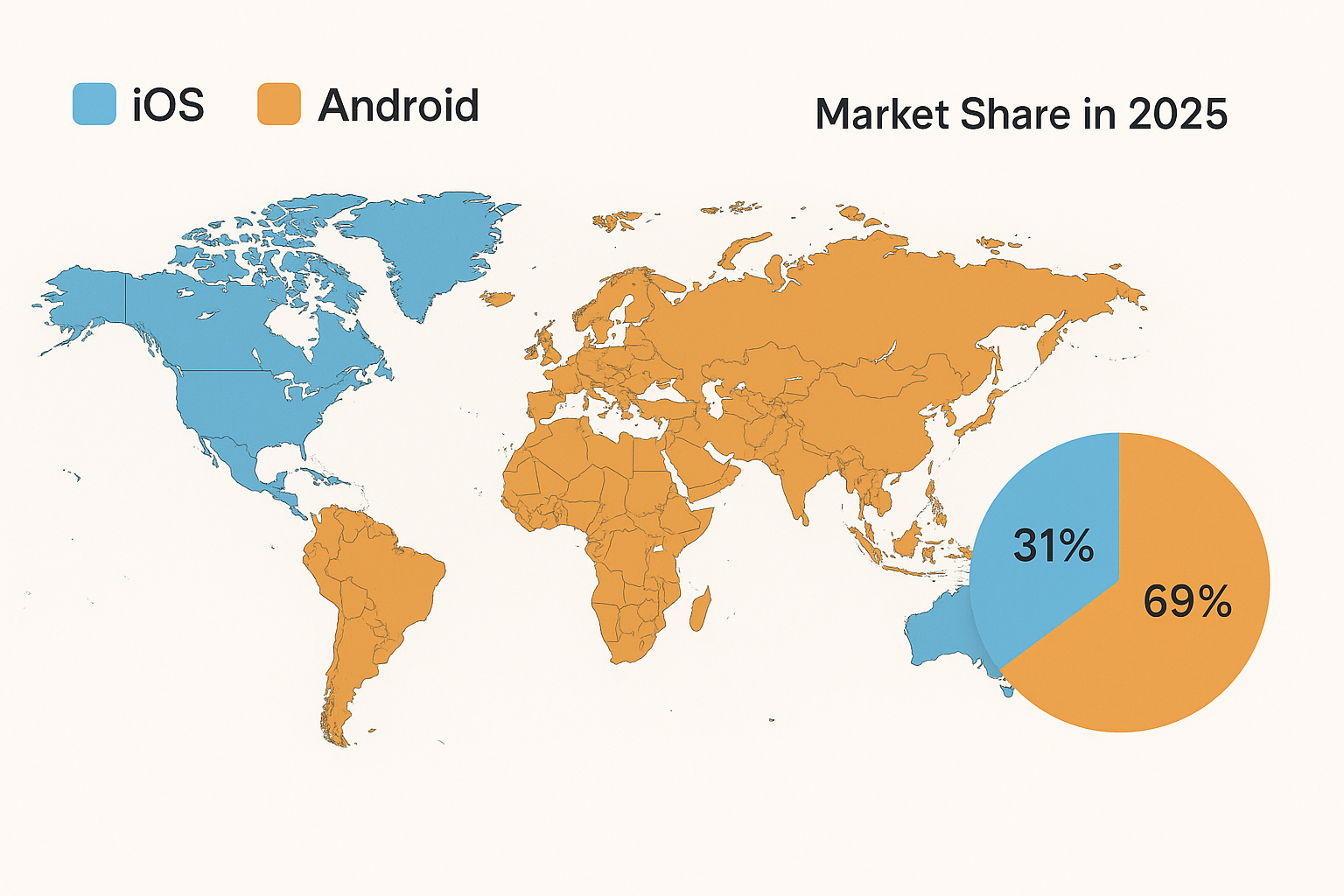iOS vs Android
iOS vs Android: This isn’t just a tech debate anymore. In 2025, it’s a key business decision. Mobile apps have become necessary tools for growth, whether you run a retail store, a service-based company, or a fast-growing startup. The right app can build stronger customer relationships, increase engagement, and unlock new revenue streams.
But before you jump into app development, there’s one question every smart business owner must ask:
Should I build my app for iOS or Android?
Let’s break down the key differences between iOS vs Android that matter most to your business this year so that you can make the right call with confidence.
iOS vs Android: Why This Decision Matters for Your Business
Both iOS and Android dominate the mobile app world, but they offer very different user bases, market behaviours, and business opportunities. Your choice affects everything, from your development budget to how customers interact with your brand.
So, as a business owner, you need to look beyond just “which is better.”
Instead, ask:
- Who are my customers?
- Where are they located?
- What kind of experience do I want my app to deliver?
Let’s break it down.
Market Share and Audience Demographics

Android in 2025:
- Still leads globally with the largest market share, especially in Asia, Africa, and Latin America.
- Great for businesses targeting mass markets or emerging economies.
- Often used by budget-conscious customers and a wide variety of age groups.
iOS in 2025:
- Stronghold remains in the US, UK, Australia, and Western Europe.
- iOS users are typically higher-income individuals, more likely to spend on apps and services.
- Ideal for premium products, lifestyle brands, or B2B services.
Business takeaway:
Targeting global or price-sensitive users? Go Android.
Targeting affluent users or premium markets? Choose iOS.
Development Time and Cost: What You Should Know
As a business owner, you care about two important things:
How much will it cost? And how quickly can I launch my app?
Here’s how iOS vs Android compares when it comes to time and money.
Android Apps: More Devices, More Time
- Longer Development Time: Android apps usually take more time to build and test. This is because they need to work on many different phones and tablets, each with different screen sizes, features, and hardware.
- More Testing Required: Since Android runs on many brands (Samsung, Xiaomi, OnePlus, etc.), your app needs extra testing to make sure it works well on all of them.
- Development Language: Android apps are mainly built with Java or Kotlin, which are powerful but can take longer to code and test compared to Apple’s Swift.
- Lower Publishing Costs: Google Play charges a one-time $25 fee to publish your app, which is cheaper than Apple’s yearly fee.
- Higher Development Cost: The extra time and testing usually mean higher development costs overall.
iOS Apps: Faster and More Focused
- Faster Development: Apple controls all iPhones and iPads, so there are fewer devices to support. This means your app can be built and tested much faster.
- Quicker Testing: Since iOS runs on a small number of devices, your app needs less testing time, reducing your launch timeline.
- Modern Language: iOS apps use Swift, which is designed to be faster and easier to write, helping speed up development.
- Faster Time to Market: All of the above means your app can go live sooner, which is a big advantage if you're on a tight schedule.
- Higher Publishing Cost: Apple charges a $99 annual developer fee, which is more than Google, but it comes with strong security, support, and trusted branding.
- Lower Ongoing Costs: Less time spent testing and fixing device-specific issues can save you money in the long run.
Business takeaway
If you want a faster go-to-market time, start with iOS.
If you want maximum device coverage, plan for Android, but allow a bit more time and budget.
App Store Approval Process
Apple (iOS):
- Very strict review process. Apps must follow detailed guidelines.
- Takes more time to get approved, but offers better quality control.
Google Play (Android):
- Faster approval times and a more flexible process.
- Easier for businesses to launch quickly and make updates.
Business takeaway:
If you want to launch fast and make frequent updates, Android might be easier.
If you care more about control, security, and long-term stability, iOS is the way to go.
User Spending Habits
This might be one of the biggest deciding factors for your bottom line.
- iOS users spend more on paid apps, in-app purchases, and subscriptions.
- Android users typically prefer free apps and ad-supported models.
Business takeaway:
If your app generates income through purchases or subscriptions, iOS could bring in higher revenue.
If your model depends on ads or large-scale reach, Android works better.
Security and Privacy
Apple has always been known for putting security first.
- iOS offers strong privacy controls, app tracking transparency, and encrypted data handling.
- Android has made major improvements, but security can vary by device manufacturer.
Business takeaway:
If your app handles sensitive data (like health, finance, or client info), iOS is generally more secure.
If you’re building a more public-facing app, both platforms are safe with proper development.
Maintenance and Updates
Long-term app success isn’t just about launch, it's about maintenance.
- iOS users update their phones more regularly, which makes it easier to support new features.
- Android updates vary by brand, meaning older devices may lag.
Business takeaway:
If you want to reduce support costs and ensure smoother performance, iOS might be more efficient in the long run.
Monetisation Models That Work Best
|
Model |
Works Best On |
Why |
|
In-App Purchases |
iOS |
Users are more willing to pay for features |
|
Ad Revenue |
Android |
A large user base helps scale ad views |
|
Subscription Services |
iOS |
Higher acceptance of paid plans |
|
Freemium Models |
Both |
Common and effective when done right |
Should You Build for Both Platforms?
Eventually, yes. But as a business owner, you don’t always need to start with both.
If budget or time is limited, consider launching your app on one platform first and expanding later. Many businesses begin with iOS to test the market and add Android once they see traction.
Final Thoughts: iOS vs Android in 2025, What Should You Choose?
Choosing between iOS vs Android in 2025 isn’t just a technical decision; it’s a business decision. It impacts your customers, your brand, and your profit.
Here’s a quick recap:
Choose Android if:
- You’re targeting a global or price-sensitive audience
- You want a flexible, quick-launch model
- You prefer wider device coverage
Choose iOS if:
- You’re targeting premium markets or high-spending users
- You want faster development and fewer device compatibility issues
- You care about data privacy and strong app security
Ready to turn your app idea into reality? Start with a clear strategy, choose the right platform, define your audience, and build for success.
Build Your App with WOWinfotech
At WOWinfotech, we help businesses create mobile apps for both iOS vs Android. Whether you’re just starting or growing fast, our team can build the right app for your needs.
We handle everything, from planning and design to development and launch. Our goal is to deliver apps that are easy to use, work smoothly, and help your business grow.
Still not sure? Where to start?
We’ll guide you and help you choose the best platform for your app.
Get in touch with us to start your app journey today.
Frequently Asked Questions
1. Why choose iOS over Android?
iOS offers a smoother, more consistent user experience with timely updates and strong integration across Apple devices.
Its sleek interface, better app quality control, and enhanced privacy features appeal to many users.
2. What are the disadvantages of iOS over Android?
iOS is less customizable and restricts certain features that Android users enjoy freely.
It also supports fewer hardware options and often comes with a higher price tag.
3. Which software is better between iOS and Android?
It depends on user preferences—iOS is known for its simplicity and security, while Android excels in flexibility and customization.
Both are powerful platforms with unique strengths tailored to different needs.
4. Which is more safe iOS or Android?
iOS is generally considered safer due to strict app store policies and faster security updates.
However, Android has improved greatly and offers more control over app permissions.
-

Krishna Handge
WOWinfotech
Jul 14,2025
.png)